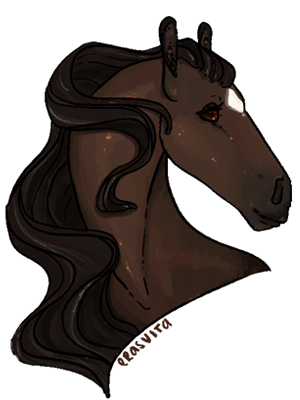
A S T E R I O N
in sunshine and in shadow*
Leonidas denies him, but Asterion feels only relief at that murmur; he can hear the quiet in it, the uncertainty, and knows that the battle is half won (but what is the battle?). Still, he watches those golden eyes - and where had he inherited them, had it been Karou? - dart to the woods. Oh, his nephew is a wild thing, more feral than his mother, and it builds up the bay stallion’s guilt brick by solid brick. Don’t run, he begs. Don’t go where I cannot follow. And
I’m sorry.
I’m so sorry.
“Everyone has a family,” he says, softly. And in some way he understands. Yes, because he, too, was born with a twin; they slept together, dreaming before they lived, tangled like ivy. He, too, never knew his father, and left his mother young. But not so young, and not so terribly.
Slowly, gently, he takes a step nearer. Near enough to see the silver gleam at the corner of the boy’s eye, near enough to see it become a tear and track down. Asterion wishes he could take it from him. He, too, wants to cry. “You have a mother,” he says, quietly, insistently. “She loves you very much.” His voice does not stay steady; it wavers on the words. Oh, Flora, he thinks. I don’t know how to do this.
When Leonidas tells him to go, the bay shakes his head. But he stops, though his heart begs him to close up the distance between them, to run his muzzle over the boy’s neck, to breathe soft breaths into his mane, to soothe him like a father (how does a father soothe?). “Let me stay with you,” he says, and he is half-begging himself. He wants to close his eyes, to gather his thoughts, but he is afraid the boy will dissolve like a specter if he does. “Leonidas, I - I have no home. Let me stay with you?”
@
